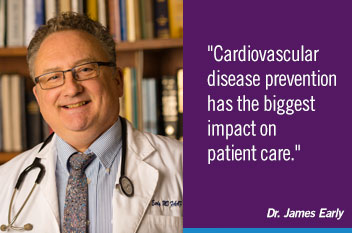Implementing Evidence-based Heart Health Care in Asheville
 East Asheville (NC) Family Health Care is a two-provider primary care practice in this North Carolina retirement mecca. Like many of America's small- and mid-size practices, East Asheville's clinicians are on the front lines of the rapid pace of change in health care, evolving requirements, and competing priorities, all of which bite into shoestring budgets and resources needed to keep the practice running.
East Asheville (NC) Family Health Care is a two-provider primary care practice in this North Carolina retirement mecca. Like many of America's small- and mid-size practices, East Asheville's clinicians are on the front lines of the rapid pace of change in health care, evolving requirements, and competing priorities, all of which bite into shoestring budgets and resources needed to keep the practice running.
That's why when East Asheville's Dr. James Early saw a chance in 2016 to participate in AHRQ's EvidenceNOW initiative, he was all in. With its focus on improving the delivery of heart health care, EvidenceNOW differs from other quality improvement efforts.
"The reason I really went for this is because cardiovascular disease prevention has the biggest impact on patient care," says James, a family medicine physician who runs East Asheville. Along with a nurse practitioner and the help of two medical assistants, James sees about 1,800 patients who skew older. "This is a population health study, and that was refreshing. Prevention is based on population health."
The other draw: East Asheville would get access to a practice facilitator who would help them implement evidence-based approaches to heart disease prevention. For East Asheville that came in the form of Dr. Leslie McDowell, a practice facilitator, quality improvement consultant, and practice cheerleader on loan from the nearby Mountain Area Health Education Center.
Getting Evidence Into Everyday Practice
The East Asheville team "rolled up its sleeves and worked together to develop a way to do [heart disease risk calculations] themselves."
Dr. Leslie McDowell
One of the first challenges the East Asheville team encountered in improving their preventive heart health care was identifying patients between ages 40 and 79 who had not had a heart issue yet. "These are people who have not had a heart attack or stroke, so how do we keep them from having one?" asks Leslie.
After two different data systems—including the practice's own EHR—could not extract the crucial data needed to calculate the risk of a heart attack or stroke in these patients, the East Asheville team "rolled up its sleeves and worked together to develop a way to just do it themselves," added Leslie, who was a linchpin in helping the practice design a workflow to easily hand-calculate each patient's risk score.
While some practices might have given up once it was clear it was not possible to get the risk scores from the EHR, East Asheville didn't. The practice's success in solving this problem resulted from a combination of James' grit and Leslie's practice facilitator ingenuity.
As a result, in the first eight months of 2017, East Asheville calculated heart event risk scores for 432 seemingly healthy patients. That led to 230 of those patients being prescribed a statin and 368 an aspirin—two of the four ABCS of preventive heart health care.
"It's very powerful for patients to see their risk of a heart attack over the next 10 years," said James. "Using scores is a real innovation. I see it as a major advance in how to take care of people in the future."
This story is courtesy of Heart Health Now!, the EvidenceNOW North Carolina Cooperative.



